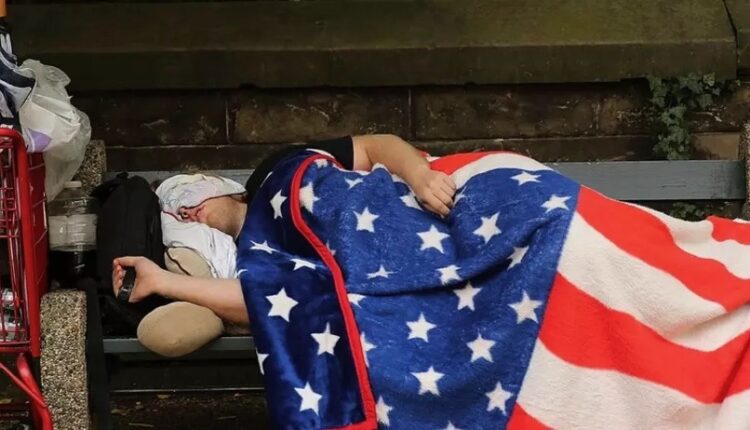
Trump and I can agree: The U.S. is a ‘third-world country’
From AlJazeera
When on August 8 the Federal Bureau of Investigation (FBI) raided Donald Trump’s Mar-a-Lago estate in Florida in search of classified documents, the ex-president of the United States decried the episode as “an assault [that] could only take place in broken, third-world countries”. He continued to lament that America had “now become one of those countries, corrupt at a level not seen before”.
Trump’s son, Donald Trump Jr, chimed in on Twitter with the assessment: “This is what you see happen in 3rd World Banana Republics!!!” Never mind that the FBI’s seizure of secret documents does not fit the “corruption” bill quite as well as some other characteristics of American democracy: say, the fact that non-taxpaying billionaires can be president or that the country is run as a crooked, oligarchic corporatocracy.
This is not the first time Trump has likened the US to a “third-world country”, which was also his epithet of choice when he lost the 2020 presidential election to Joe Biden. But Trump & Co are not the only members of the U.S. ruling elite to exercise this vocabulary. The January 2021 attack on the U.S. Capitol prompted a surge in pejorative “third world” and “banana republic” comparisons from everyone from Biden to George W Bush, former U.S. leader and civilized ravager of Afghanistan and Iraq.
Indeed, it is impossible to understate the bipartisan imperial hubris that is on display in the casual deployment of such lingo. By implicitly and unironically mocking underdeveloped nations, the U.S. political establishment appears to have conveniently forgotten the country’s own historical role in creating the “banana republic” phenomenon in the first place — and in ensuring that the “third world” remains, you know, “third”.
The term “banana republic” was coined in 1904 by American writer O Henry in reference to the Central American nation of Honduras, which, like neighboring Guatemala, was an early victim of predatory U.S. capitalism and corporate exploitation. The economic and physical wellbeing of the inhabitants of such lowly nations was naturally of no concern to the hemispheric behemoth, which ensured its unfettered access to regional resources by backing right-wing coups, bloody civil wars, corrupt dictatorships and death squads — in other words, stuff that was slightly more devastating than an FBI search of Mar-a-Lago.
The Cold War, of course, provided a handy alibi for U.S.-backed killing worldwide, from Nicaragua to Angola — while also spawning the “third-world” designation that would go on to accrue patronizing connotations. Once the communist menace had been replaced with the terrorist menace as the primary U.S. excuse for lethal international interference, the remaining global superpower continued to extend a charitable hand to the impoverished “third world” — often via a form of corporate neocolonialism cast as “development”.
And while Trump’s recent tantrum about the U.S. as a “broken, third-world” country can certainly be filed under the expansive category of Distastefully Kooky Things Trump Has Said, there is also an unintended element of truth to it. Like it or not, the U.S. fits the third-world stereotype in many respects — and not just in terms of its oligarchic style of governance.
The U.S. advertises itself as being at the vanguard of global “development”, but the nation’s healthcare, poverty and other indicators suggest a policy of willful counter development instead. Back in 2017, Philip Alston, the United Nations special rapporteur on extreme poverty and human rights, visited the US for two weeks. At the end of his trip, he issued a statement on how he found the country “exceptional in … ways that are shockingly at odds with its immense wealth and its founding commitment to human rights”.
Despite managing to spend more money on “national defence” than China, Russia, the United Kingdom and a bunch of other big spenders combined, the U.S. had some “40 million people” living in poverty amid glaring “contrasts between private wealth and public squalor”.
As Alston noted, the U.S. was also “alone among developed countries” in insisting that human rights did “not include rights that guard against dying of hunger, dying from a lack of access to affordable healthcare, or growing up in a context of total deprivation”. So much for that line from the U.S. Declaration of Independence about “inalienable” rights to “life, liberty and the pursuit of happiness”. It’s hard to pursue anything if you’re dead.
Speaking of death, infant mortality rates in the US are higher than in Cuba, an island that has spent more than 60 years under an asphyxiating US embargo. Trump himself imposed no fewer than 243 new sanctions against the Cubans — as punishment for their crime of pursuing national sovereignty over the “banana republic” model — and, for good measure, threw Cuba back on the U.S. list of state sponsors of terrorism.
Back in the land of the free, meanwhile, homelessness has reached ghastly levels unseen even in many “underdeveloped” countries, and the U.S. has long maintained the highest incarceration rate in the world — although it may have recently been surpassed by El Salvador, another place where U.S. support for “human rights” has involved backing right-wing state terror.
Such is the ironic nature of imperial power, it seems, that the global hegemon responsible for oppressing much of the third world must also keep a significant portion of its own populace in third-world conditions.
As per Trump’s twisted logic, any attempt to hold him accountable for anything is evidence that the U.S. is a “corrupt” and “broken, third-world” country. And while there’s no sense in wasting time on Trumpian delusion, we might nonetheless take the opportunity to recall that old saying about the broken clock — and to acknowledge that the U.S. is definitively broken.

